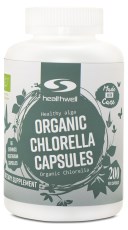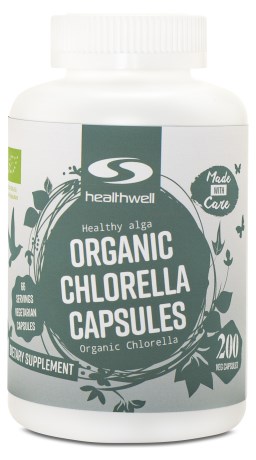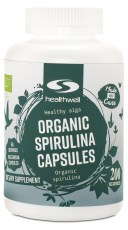

Chlorella Capsules ECO
- Highly nutrient-dense
- Chlorophyll and omega-3
- Product description
- Nutritional content
Natural and nutritious algae
Chlorella is a green freshwater algae and one of nature's most nutritious plants. The chlorella algae is full of important vitamins and minerals and has a high content of omega 3 fatty acids. It also contains the highest level chlorophyll in comparison to any other plant in the world, which makes it a popular product in connection with cleanses. Use chlorella as a daily supplement for a healthy lifestyle!
- Naturally rich in vitamins and minerals
- Antioxidants
- All essential amino acids
- Omega-3
- ECO-certified
Chlorella content
Chlorella is rich in the beneficial fatty acids omega-3 and omega-6, both of which have several important functions in the body. Chlorella also contains vitamins C, E and copper, which act as antioxidants, as well as the minerals iron and vitamin B12. In addition to vitamins and minerals, over 60% of chlorella algae is made up of protein and contain all the essential amino acids, making chlorella a perfect supplement to complement the regular diet, especially for vegans or vegetarians who eat only plant-based protein sources.
Tip! Do you prefer chlorella in powder form? Try Chlorella ECO.
What is the difference between chlorella and spirulina?
The two so-called "super algae" chlorella and spirulina are algae that both grow in freshwater, but the difference is that chlorella contains more chlorophyll than spirulina. This makes chlorella a popular supplement to use in cleanses.
What does it mean when we say the product is EU-organic?
In organic food production, biodiversity, the conservation of natural resources, environmental practices and strict animal welfare are observed (1). In order for a product to be labeled as EU-organic, the label used within the EU, a product must meet strict conditions that apply to the entire production chain. The product must contain at least 95% organic ingredients, and in addition, the other 5% must meet other strict conditions (1).
In organic crop production, it is important to promote soil fertility and to allow for perennial crop rotation and a cycle of organic material. Therefore, fertilizers, compost and plant protection products should only be used if they comply with the principles and objectives of organic production. In general, the EU requires that an organic food must be produced without synthetically produced chemical pesticides and without artificial fertilizers. In organic production, genetic engineering is also prohibited. In addition, production should primarily rely on renewable resources (2).

Vegetarian Friendly
The symbol Vegetarian Friendly indicates that the product's content is plant-based. The product is also suitable for vegans.

references:
1 & 2. EG. 2007. Rådets förordning (EG) nr 834/2007 om ekologisk produktion och märkning av ekologiska produkter och om upphävande av förordning (EEG) nr 2092/91. (Retrieved 2021-09-24)





